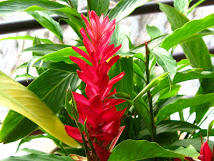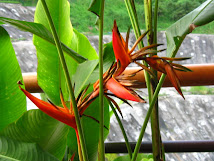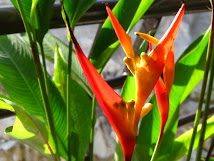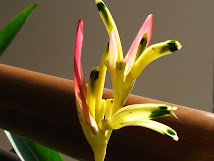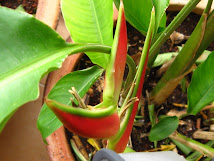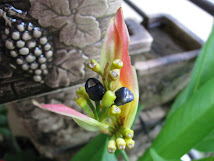Welcome to Heliconias... Heliconias... Heliconias
This blog is all about growing Heliconias, an exotic plant not native to Malaysia. All pictures shown are digital photos of the actual species in my garden such as Rostrata, Dwarf Jamaican, Latispatha and several psittacorums such as Andromeda, Lady Di, Fuschia, Strawberry & Cream and hybrids such as Golden Torch and Alan Carle.
Heliconia are close relatives of gingers, bananas, birds-of-paradise and traveler’s palms. There are more than 200 (350 including cultivars) documented species of the single genus, with the bulk of them originating from Central and South America such as Guyana, Costa Rica, Berlize, Ecuador, Peru and Brazil. You may be interested to note that about 6 species have evolved separately in the South Pacific and Indonesia, and typically have green inflorescence.The name "heliconia" actually comes from Greek mythology after the great Mount Helicon, the abode of the muses of the arts and sciences.
The beauty of the heliconia lies in the brightly coloured bracts that are mistakenly called the flowers. The actual flower is the tiny little flowers that emerge from the large showy bracts. Each stem can only flower once, after which the entire stem deteriorates, drives up and collapses. As such, it is recommended to cut at the base of 'flowered-out' stems.
BTW, this blog has been read by visitors from Australia, Brazil, Chile, Colombia, France, India, Japan, Malaysia, Philippines, Puerto Rico, Mexico, Netherlands Antilles, Netherland, Singapore, Spain, Thailand, Trinidad & Tobago, United Kingdom & United States of America :-)
16th Sept 2009 : 17:30
Heliconia are close relatives of gingers, bananas, birds-of-paradise and traveler’s palms. There are more than 200 (350 including cultivars) documented species of the single genus, with the bulk of them originating from Central and South America such as Guyana, Costa Rica, Berlize, Ecuador, Peru and Brazil. You may be interested to note that about 6 species have evolved separately in the South Pacific and Indonesia, and typically have green inflorescence.The name "heliconia" actually comes from Greek mythology after the great Mount Helicon, the abode of the muses of the arts and sciences.
The beauty of the heliconia lies in the brightly coloured bracts that are mistakenly called the flowers. The actual flower is the tiny little flowers that emerge from the large showy bracts. Each stem can only flower once, after which the entire stem deteriorates, drives up and collapses. As such, it is recommended to cut at the base of 'flowered-out' stems.
BTW, this blog has been read by visitors from Australia, Brazil, Chile, Colombia, France, India, Japan, Malaysia, Philippines, Puerto Rico, Mexico, Netherlands Antilles, Netherland, Singapore, Spain, Thailand, Trinidad & Tobago, United Kingdom & United States of America :-)
16th Sept 2009 : 17:30
Showing posts with label Andromeda. Show all posts
Showing posts with label Andromeda. Show all posts
Saturday, April 24, 2010
Saturday, October 31, 2009
Flowering Heliconias Today
Hooray ! Finally the psittacorum that looked like Lady Di but with Orange stamens instead of yellow stamens ie the psittacorum cultivar known as St Vincent Red decided to flower :-)
psittacorum cv St Vincent Red
psittacorum cv Andromeda
psittacorum cv Lady Di
Stricta Dwarf Jamaican
Friday, January 30, 2009
Saturday, January 3, 2009
Watching Flower Growth : Andromeda
Sunday, October 12, 2008
cv Andromeda, Heliconia psittacorum L.f .
 16th November 2008
16th November 2008 9th November 2008
9th November 2008 8th November 2008
8th November 2008 7th November 2008
7th November 2008 18th October 2008
18th October 2008 18th October 2008
18th October 2008Blooming
All year.
Height
1.5 - 9 Feet
Habitat
Full sun to 50 % of shade
Distribution
Guyana [now widely cultivated]
Inflorescence
Bracts
3-5 bracts.
Somewhat variable outer surface orange to red. Sometimes with green tint on keel. Inner surface red shading to orange proximally.
Rachis
Orange, Orange with red infusion or green.
Sepals
Orange with distal metallic black or green band & ornage tip.
Ovary
Dark orange distally & light orange or orange below.
Pedicel
Orange
Vegetation
Musoid
Labels:
Andromeda,
Blooming,
bracts,
Heliconia,
Inflorescence,
Ovary,
peduncle,
psittacorium,
rachis,
Sepals,
Vegetation
Subscribe to:
Posts (Atom)



























